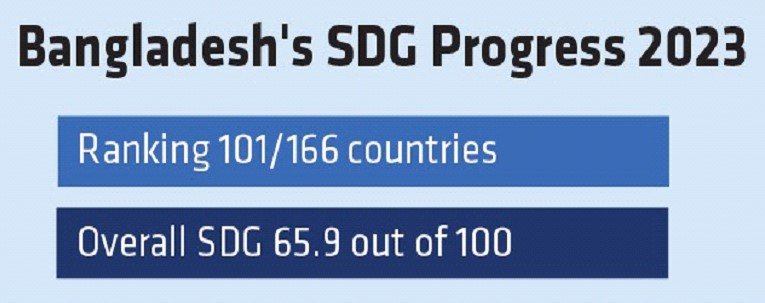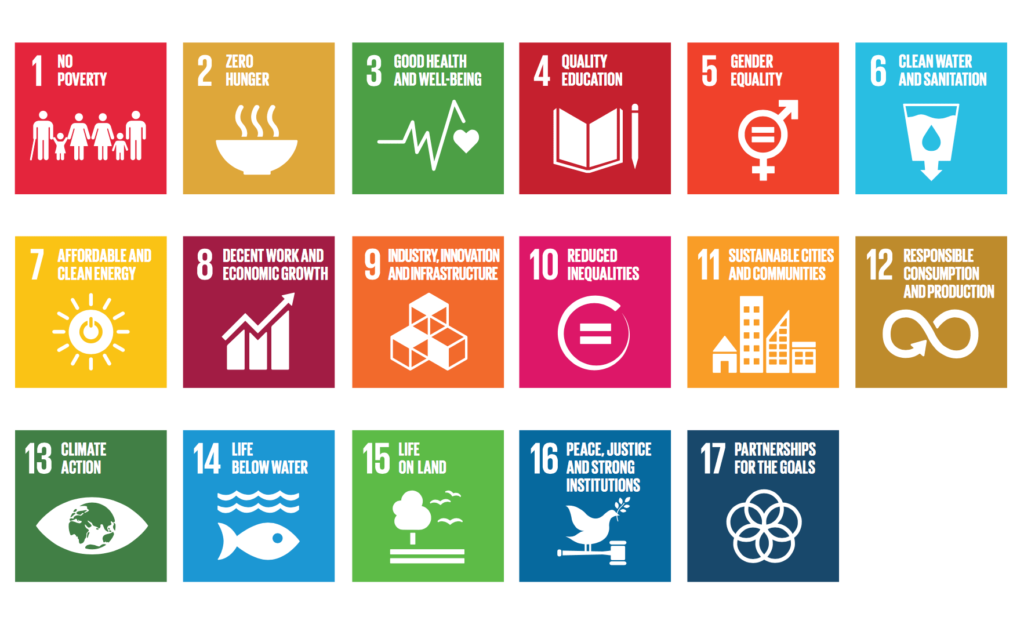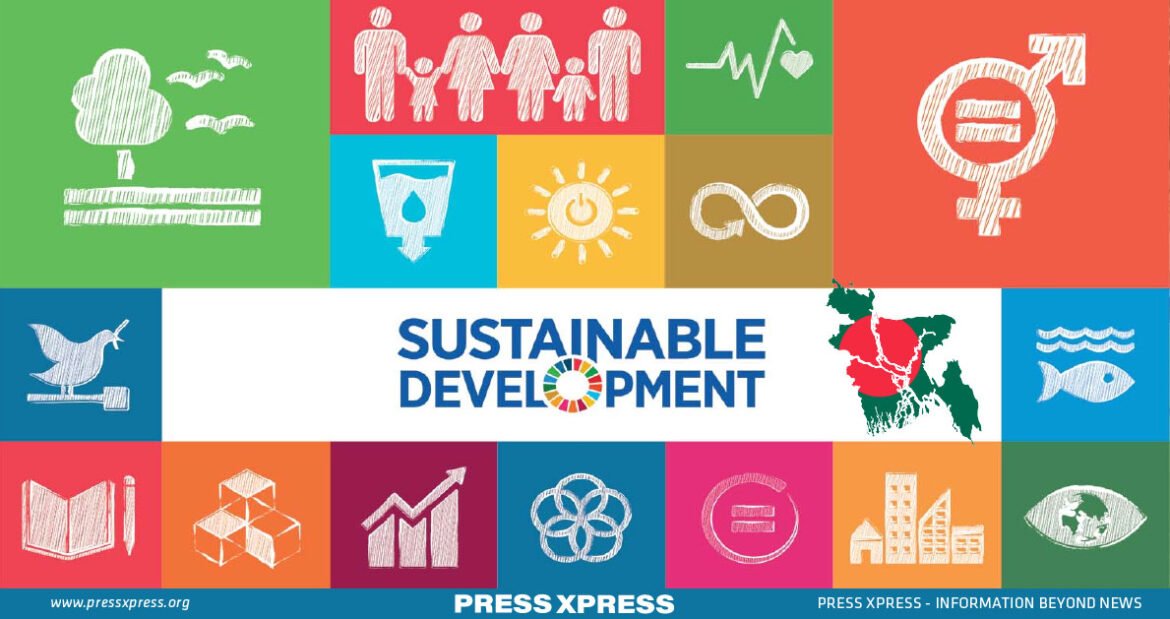Bangladesh’s journey towards achieving the SDGs underscores the importance of collaborative efforts, innovation, and commitment from all stakeholders
The Sustainable Development Goals (SDGs) are a set of 17 interconnected global objectives established by the United Nations in 2015 as part of the 2030 Agenda for Sustainable Development. These goals encompass a wide range of economic, social, and environmental targets aimed at addressing the world’s most pressing challenges, including poverty, inequality, climate change, environmental degradation, peace, and justice. The SDGs serve as a universal call to action, urging governments, businesses, civil society, and individuals to work collaboratively towards a more sustainable and equitable future for all. Each goal is accompanied by specific targets and indicators to track progress, with the overarching aim of fostering inclusive and sustainable development on a global scale.
Building upon the foundation laid by the Millennium Development Goals (MDGs), the SDGs offer a more comprehensive and inclusive approach, encompassing not only poverty eradication and meeting basic human needs but also promoting social, economic, and environmental sustainability.

Bangladesh’s SDG performance
Relying solely on measures of economic growth and GDP may not necessarily lead to an enhanced quality of life for a nation’s populace. This highlights the significance of attaining the Sustainable Development Goals (SDGs), especially for developing countries like Bangladesh.
In 2023, Bangladesh was ranked 101st out of 166 countries in the Sustainable Development Goals (SDG) Index Rank, according to the Sustainable Development Report 2023. The nation received an overall SDG Index Score of 65.9 out of 100. This article explores the findings of the UNDP’s SDG Bangladesh Progress Report 2020 and the Sustainable Development Report 2023 to evaluate Bangladesh’s advancement towards fulfilling the SDGs.

As per The Sustainable Development Report, around 30.9% of SDG targets in Bangladesh were considered ‘achieved or on track’, while 41.2% displayed ‘limited progress’, and 27.9% were classified as ‘worsening’. The SDG dashboard provides valuable insights into the trajectory of SDG goals, shedding light on their current trends and potential future outcomes.
Assessment of SDG Progress in Bangladesh
As per The Sustainable Development Report, approximately 30.9% of Bangladesh’s SDG targets have been ‘achieved or are on track’, while 41.2% are making ‘limited progress’, and 27.9% are deteriorating. The SDG dashboard offers valuable insights into the trajectory and direction of the goals, indicating their current trends and potential future outcomes.
Remarkable Progress Achieved
In Quality Education (SDG 4) and Responsible Consumption and Production (SDG 12). Bangladesh has made notable progress in two of the 17 SDG goals: Quality Education (SDG 4) and Responsible Consumption and Production (SDG 12). As per the SDG Dashboard, these specific goals are either ‘on track’ or maintaining their SDG achievement status.
Moderately Improving
Amid significant challenges, six goals are showing moderate improvement: No Poverty (SDG 1), Zero Hunger (SDG 2), Good Health and Well-Being (SDG 3), Clean Water and Sanitation (SDG 6), Affordable and Clean Energy (SDG 7), and Industry, Innovation and Infrastructure (SDG 9).
Already Achieved
Bangladesh has successfully achieved two goals: Responsible Consumption and Production (SDG 12) and Climate Action (SDG 13). However, five SDG goals are currently stagnant, including Gender Equality (SDG 5), Decent Work and Economic Growth (SDG 8), Sustainable Cities and Communities (SDG 11), Climate Action (SDG 13), and Partnerships for the Goals (SDG 17). Additionally, three SDG goals are experiencing a decrease in progress: Life below Water (SDG 14), Life on Land (SDG 15), and Peace, Justice, and Strong Institutions (SDG 16). Trend information for Reduced Inequalities (SDG 10) is currently unavailable.
Policy Support and Advances Made
Bangladesh has made significant strides in various aspects of sustainable development, supported by robust policy measures and initiatives.
Poverty Alleviation and Social Security: The country has seen substantial progress in reducing poverty rates, with notable decreases in the percentage of people living below both international and national poverty lines. The National Social Security Strategy and the 8th Five Year Plan prioritize inclusivity and prosperity, with measures such as the establishment of strategic funds and financial inclusion strategies.
Healthcare and Sanitation: Bangladesh has witnessed improvements in healthcare access and sanitation, with increased rates of antenatal care, primary school completion, and access to improved water sources and electricity. Efforts to combat malnutrition and improve maternal and child health have also been undertaken, including extended maternity leave and supplementation programs.
Disaster Management and Climate Resilience: The government has adopted comprehensive disaster management plans, aligned with international frameworks like the Sendai Framework. Initiatives include the establishment of marine protected areas, disaster risk reduction plans, and policies to mitigate climate change impacts.
Energy Sector Development: Bangladesh has made remarkable progress in the energy sector, with significant increases in electricity access and generation capacity. Strategic plans such as the Power System Master Plan aim to ensure sustainable energy management and meet SDG 7 targets.
Conservation and Biodiversity: Efforts to conserve biodiversity and natural resources have been notable, with the establishment of protected areas and wildlife preservation acts. The country has made strides in forest conservation and habitat protection, contributing to global conservation efforts.
Human Rights and Governance: Bangladesh has strengthened institutions and governance mechanisms, including the establishment of the National Human Rights Commission and the adoption of laws to promote human rights, such as the Child Marriage Restraint Act. Initiatives for transparency and citizen participation, such as the Right to Information Act, have also been implemented.
International Cooperation and Partnership: Bangladesh actively engages in global forums and partnerships to facilitate development cooperation and resource mobilization. Participation in platforms like the High-Level Political Forum and strategic partnerships with foreign countries contribute to achieving sustainable development goals.
Resource Mobilization and Technology: The country relies on diverse sources to mobilize resources, including tax revenue and foreign direct investment. Investments in technology infrastructure, such as fiber optics networks, have led to significant improvements in connectivity and access to information and communication technologies.
Overall, Bangladesh’s progress in sustainable development reflects a concerted effort to address key challenges and leverage opportunities for inclusive and resilient growth.
Bangladesh has made commendable progress in its journey toward achieving the Sustainable Development Goals (SDGs).

The Sustainable Development Report highlights Bangladesh’s significant progress across various sectors. Notably:
Approximately 30.9% of SDG targets have been achieved or are on track.
Around 41.2% of targets show limited progress, indicating ongoing efforts.
Unfortunately, 27.9% of targets are experiencing deterioration, warranting focused attention.
Key Focus Areas
Women’s Empowerment: Bangladesh has expanded opportunities for women, contributing to overall progress.
Economic Growth: Efforts to bolster the economy have positively influenced sustainable development.
Digital Advancements: Emphasis on digital infrastructure has played a pivotal role in advancing development goals.
Regional Development: Targeting underdeveloped regions has been crucial for balanced growth.
Infrastructure Improvement: Enhancing infrastructure remains pivotal for SDG achievement.
SDG Index Score:
In the preceding year (2023), Bangladesh attained a commendable SDG index score of 63.26%.
Noteworthy is the country’s progress since the adoption of the SDGs in 2015, with an increase from 59.01% to 63.26%.
Over the past five years, Bangladesh has witnessed a 4.4% rise in its SDG index score, indicating sustained efforts towards sustainable development.
Despite facing challenges, Bangladesh maintains its unwavering commitment to sustainable development. Through continued efforts, innovative strategies, and global collaboration, the nation aspires to realize the 2030 Agenda, paving the way for a more prosperous and equitable world.
Goals of SDG

These goals recognize the interconnectedness of social, economic, and environmental challenges and emphasize collaboration among governments, organizations, businesses, and individuals to create positive change. Achieving the SDGs requires collective effort, innovation, and commitment from all stakeholders.
Conclusion
Bangladesh’s journey towards achieving the SDGs reflects a concerted effort to address key challenges and leverage opportunities for inclusive and resilient growth. Despite facing obstacles, the nation remains steadfast in its commitment to sustainable development, emphasizing collaboration and innovation to realize the 2030 Agenda for a better and more equitable world.


